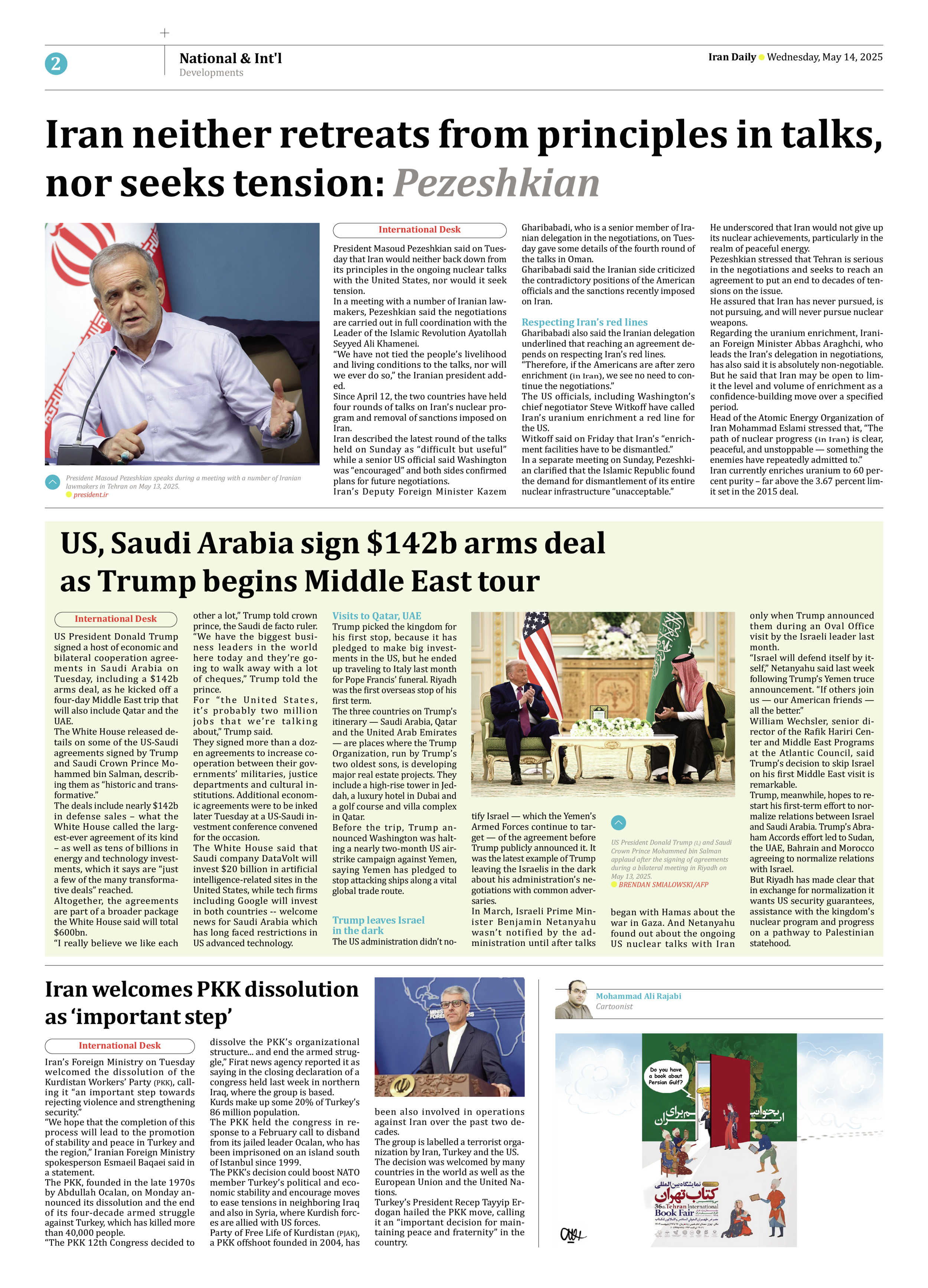
US, Saudi Arabia sign $142b arms deal as Trump begins Middle East tour
US President Donald Trump signed a host of economic and bilateral cooperation agreements in Saudi Arabia on Tuesday, including a $142b arms deal, as he kicked off a four-day Middle East trip that will also include Qatar and the UAE.
The White House released details on some of the US-Saudi agreements signed by Trump and Saudi Crown Prince Mohammed bin Salman, describing them as “historic and transformative.”
The deals include nearly $142b in defense sales – what the White House called the largest-ever agreement of its kind – as well as tens of billions in energy and technology investments, which it says are “just a few of the many transformative deals” reached.
Altogether, the agreements are part of a broader package the White House said will total $600bn.
“I really believe we like each other a lot,” Trump told crown prince, the Saudi de facto ruler.
“We have the biggest business leaders in the world here today and they’re going to walk away with a lot of cheques,” Trump told the prince.
For “the United States, it’s probably two million jobs that we’re talking about,” Trump said.
They signed more than a dozen agreements to increase cooperation between their governments’ militaries, justice departments and cultural institutions. Additional economic agreements were to be inked later Tuesday at a US-Saudi investment conference convened for the occasion.
The White House said that Saudi company DataVolt will invest $20 billion in artificial intelligence-related sites in the United States, while tech firms including Google will invest in both countries -- welcome news for Saudi Arabia which has long faced restrictions in US advanced technology.
Visits to Qatar, UAE
Trump picked the kingdom for his first stop, because it has pledged to make big investments in the US, but he ended up traveling to Italy last month for Pope Francis’ funeral. Riyadh was the first overseas stop of his first term.
The three countries on Trump’s itinerary — Saudi Arabia, Qatar and the United Arab Emirates — are places where the Trump Organization, run by Trump’s two oldest sons, is developing major real estate projects. They include a high-rise tower in Jeddah, a luxury hotel in Dubai and a golf course and villa complex in Qatar.
Before the trip, Trump announced Washington was halting a nearly two-month US airstrike campaign against Yemen, saying Yemen has pledged to stop attacking ships along a vital global trade route.
Trump leaves Israel
in the dark
The US administration didn’t notify Israel — which the Yemen’s Armed Forces continue to target — of the agreement before Trump publicly announced it. It was the latest example of Trump leaving the Israelis in the dark about his administration’s negotiations with common adversaries.
In March, Israeli Prime Minister Benjamin Netanyahu wasn’t notified by the administration until after talks began with Hamas about the war in Gaza. And Netanyahu found out about the ongoing US nuclear talks with Iran only when Trump announced them during an Oval Office visit by the Israeli leader last month.
“Israel will defend itself by itself,” Netanyahu said last week following Trump’s Yemen truce announcement. “If others join us — our American friends — all the better.”
William Wechsler, senior director of the Rafik Hariri Center and Middle East Programs at the Atlantic Council, said Trump’s decision to skip Israel on his first Middle East visit is remarkable.
Trump, meanwhile, hopes to restart his first-term effort to normalize relations between Israel and Saudi Arabia. Trump’s Abraham Accords effort led to Sudan, the UAE, Bahrain and Morocco agreeing to normalize relations with Israel.
But Riyadh has made clear that in exchange for normalization it wants US security guarantees, assistance with the kingdom’s nuclear program and progress on a pathway to Palestinian statehood.







